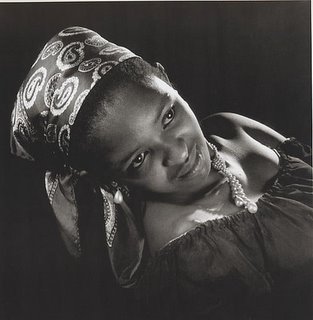
Hello, Dolly
The Royal Players, Omnyakane.
Dolly Rathebe, Tihapi Ke Noga.
Manhattan Brothers, Thaba Tseu.
In 1954, South Africa had been living under apartheid for six years. With the rise of the right-wing National Party in 1948, legislation was passed banning interracial marriage and sex, and requiring all citizens to register by race. In '50 came the Group Areas Act, which assigned the races to their designated areas; in '53, came the Native Labour Act, which prohibited blacks from striking, and the Separate Amenities Act, which imposed a sort of hyper-fused version of the public segregation still going on in the American South (separate water fountains, etc.). And on it went.
For black South Africans, in the process of being demoted to third-class citizens and forcibly herded into alleged "homelands", one bit of solace was their love of Western swing and jazz. Throughout the 1950s, black South African musicians and audiences devoured records and styles which the West had begun to consider out of date, and converted swing into a new, ebullient African music.
The Manhattan Brothers were the biggest black South African act of the '40s and '50s, essentially superstars, whose sound and look influenced a generation. The Brothers, enthralled by groups like the Ink Spots, also incorporated Zulu melodies into their songs, but as their popularity grew, the grip of the state tightened on them. They were denied visas to leave the country, and were required to use white musicians on their recording sessions (at the expense of their touring musicians, like the young Hugh Masekela). At last, the Brothers left South Africa at the end of the '50s to tour in Europe and eventually dissolved--their records, naturally, were banned in their home country.
The Brothers' "Thaba Tseu" is a pretty amazing track, a conduit through which the Mills Brothers meet Ladysmith Black Mambazo.
Dolly Rathebe, who died in 2004, was the belle of Sophiatown, the racially mixed suburb of Johannesburg that was the last hope for black South Africans, one of the few places they could still own property. It was akin to Prohibition-era Chicago, full of gangsters and molls, great music, danger and freedom. In February 1955, the government began bulldozing Sophiatown to the ground and dispersing its citizens. In all, about 65,000 people were forcibly relocated to faraway places like the Meadowlands township, in Soweto.
Like "Thaba Tseu", "Tihapi Ke Noga" is sung in Sesotho (I believe "thaba" = mountain and "tihapi" = fishes, but my ignorance is pretty striking on this stuff, so anyone with a better grasp of African culture/languages/music, please correct me.)
Of the Royal Players, I know little--there seems to be scant information on them. But with a testament like the rollicking "Omnyakane", you don't really need it.
These tracks are on the now out-of-print Township Jazz and Jive, a wonderful compilation of '50s and '60s South African jazz and boogie.
No comments:
Post a Comment